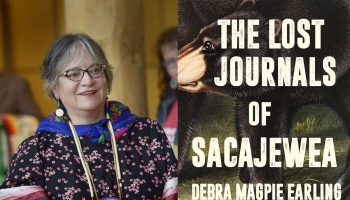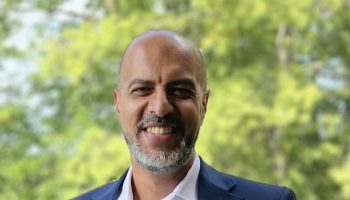
Deborah Trefts
Staff Writer
In the Amphitheater during Chautauqua Institution’s 2014 and 2018 seasons, Ken Burns showed clips from “The Vietnam War” — the 10-part, 18-hour television documentary film series that he and Lynn Novick produced and directed. It first aired on PBS in September 2017.
Episode 10, “The Weight of Memory (March 1973–Onward),” portrays in part, the fall of South Vietnam’s capital city, Saigon, to the communist North Vietnamese during their 1975 spring offensive and uprising, and the rapid airlift of American diplomatic personnel, their families and key staff. When the South Vietnamese government collapsed, thousands of South Vietnamese civilians and Americans evacuated.
This final episode of the series also includes efforts by the United States and Vietnam to reconcile. A little over a year later, on July 2, 1976, the North and South reunified under communist rule and became the Socialist Republic of Vietnam. Over the next five decades, Vietnam developed into a pillar of the East Asian economic miracle, as described by Liesbet Steer during the Women’s Club’s Contemporary Issues Forum last Saturday.
At 3 p.m. Saturday in the Hall of Philosophy — in lieu of journalist Jim Laurie, who was previously scheduled to speak about Vietnam and Cambodia circa 1975 — Dennis Wilder will give this week’s CIF talk. It is titled, “The Fall of Saigon: Lessons Learned (and Unlearned) 50 Years after the War.”
Since 2023, Wilder has been working as a consultant educator at Fairfax National Security Solutions in Fairfax, Virginia, and a senior policy adviser for Kaya Partners in London, England.
Since 2016, Wilder has been managing director of and senior fellow at Georgetown University’s Initiative for U.S.-China Dialogue on Global Issues and assistant professor of the practice in the Asian Studies Program at Georgetown’s School of Foreign Service in Washington D.C.
A “former senior American foreign intelligence official and policymaker,” he was born in Singapore and spent much of his youth in Southeast Asia (Singapore; Kuala Lumpur; Penang, Malaysia), where his parents were Methodist missionaries.
While majoring in political science at Kalamazoo University, in Kalamazoo, Michigan, Wilder spent his junior year as a participant in the Yale-in-China Mandarin Chinese Intensive program at the Chinese University of Hong Kong.
“I had the greatest time because I was a swimmer, so I immediately joined the swim team, and two Chinese students picked me out to be their roommate,” he said. “One had a brother in the Red Guard, and the other was the son of a civil servant who was Hong Kong Chinese and a Christian.”
Back at Kalamazoo, Wilder wrote his senior thesis on “The Politics of the Chinese Military High Command,” which he said updated the work of William Whitson, an Air Force officer who had written about factional politics in the Chinese Liberation Army.
In 1979, he earned a Master of Science in Foreign Service at Georgetown, where he studied with Father Sebes, who he said “was one of the old China Jesuits (who) had spent years and years studying in China before the war.” In addition to taking his required courses, Wilder “did more work with (Sebes), studying the Chinese military.”
That’s when former Central Intelligence Agency Director William Colby tapped him on the shoulder.
“He asked me what I would be doing (after graduation),” Wilder said. “I said, ‘Banker’ (at First Chicago, which was the first American bank to obtain a license to operate in Shanghai). He said, ‘Wrong answer.’ At that time, (working for the) CIA was a tap on the shoulder.”
Colby introduced him to the Eastern Forces Division in the Office of Strategic Research. “Basically, (he asked), ‘Do you want to see all the secrets on the Chinese military?’ What was I going to do? There weren’t a lot of us. No one studied it,” he said. “(China) had a backward military, and it wasn’t a threat at the time.”
In January 1980, Wilder “joined the Agency,” for which he would work for the next 36 years. During his first 12 years, he served as a “military analyst and intelligence production manager” in the China Division of the CIA’s Office of East Asian Affairs. In the spring of 1989, he was appointed deputy chief of the agency’s Tiananmen Square Task Force.
“Most of the time, I worked on China at headquarters with many trips to the region,” Wilder said. “I kept getting promoted as analyst and manager. I went back to Hong Kong for three years (1992 to 1995) (to prepare) for the transition to China from the U.K. … in July 1997.”
There, he was a “political officer” at the U.S. Consul-General Hong Kong attached to the U.S. Department of State.
“As the U.S., we were in an interesting position,” Wilder said. “We had nothing to do with the British. But it was an opportunity to put pressure on the Chinese government for democracy. We constantly heard from (U.S.) senators. We were very close to the democratic movement; we certainly gave them moral support, but we didn’t have a lot of cards to play. The British had come to democracy a little late. They’d run (Hong Kong) as a colony. … China didn’t believe in one country, two systems.”
Wilder returned to the United States in 1995 “to take over all of the China analysis as China Division Chief in the Office of East Asian Analysis” within the CIA’s Directorate of Intelligence. Among other responsibilities, he served as “Chief of the Interagency Taiwan Strait Task Force (1995 to 96) and CIA point person on the accidental bombing of the Chinese Embassy in Belgrade (May 1999).”
In 2004, Wilder was appointed special assistant to President George W. Bush and senior director for East Asia on the National Security Council, a position he held until 2009. He then served as the senior editor of the President’s Daily Brief (PDB) for President Barack Obama from 2009 to 2015.
Advising “President Bush was a political position,” he said. “I transitioned from being an analyst to a policymaker, which is a very different mindset. I was doing the bidding of the president; it’s night and day. As an intelligence officer, you never take a position or be with a political party. Suddenly, I was with Karl Rove, Vice President Cheney, and Don Rumsfeld. … I loved Condoleezza Rice and Colin Powell. I covered China and all of East Asia with a small staff.”
For half a year between his White House positions, Wilder switched gears, taking an “academic sabbatical” as a senior fellow at the Brookings Institution’s John L. Thornton China Center in Washington D.C. There, he and the center’s director, Kenneth Lieberthal, a renowned University of Michigan political science professor and a former adviser to President Bill Clinton, co-authored a groundbreaking study titled “The U.S. Intelligence Community and Foreign Policy: Getting Analysis Right.”
Although the plan had been that his sabbatical would be for a year, Wilder said, “Six months in, the CIA director called me and said, ‘Let’s have lunch.’ That never happens. He said, ‘We’re failing with Obama. He hates the president’s book; he calls it “The Book of Doom.” ’ He didn’t say that; he let his advisers do it.” So, Wilder was charged with finding out what was going on.
According to him, unlike Bush, Obama did not read the President’s Daily Brief — the “whole point of (which is to provide) the unvarnished truth” — in front of his secretary of defense and vice president in order to question them, test their knowledge and see if the facts were being sugar-coated.
As a constitutional lawyer, Obama was accustomed to reading in private, so “he’d read the briefing book on his treadmill in the residence,” Wilder said. “He’d say, ‘Why is it a paper copy? You have heard of iPads?’ But iPads transmit. … So we took everything out of an iPad, so it didn’t have the capability of transmitting. This book goes to 10 people, and normally it’s handed back.”
“For my sins for figuring out what to do with Obama, I did the PDB for six years,” he continued. “It’s like a newsroom — what are the stories of today? There are stories in the can and the breaking stuff. We put the book to bed at whatever time, until 4 a.m. We have our own graphics. I could order up any map in the world and videos. Six days a week. We have never missed a day since (President Lyndon B. Johnson) got the first PDB, wherever the president is in the world. It’s the most remarkable niche publication in the world and the most expensive.”
Occasionally “a piece fails, and a cabinet secretary says we’re wrong,” Wilder said. “Usually the facts are right, but not the analysis. Iraq’s weapons of mass destruction and 9/11 did not succeed. There are divided views about Iraq. Sometimes there’s overwhelming pressure, and we yield to great pressure. And we also believed some frankly phony sources. There were people who wanted us to go to war, and we believed what they fabricated.”
“Then (in 2015) there was a major reorganization of the CIA under John Brennan,” Wilder said. “They felt there was too much distance between the operators and the analysts, so they came up with the concept of mission centers. So I became the deputy associate director for the East Asian Mission Center. I was asked (to do this), and they wanted a fast start. That means you’re in charge of worldwide China operations and analyses.”
One year later, “Georgetown came to me,” Wilder said. “They said, ‘We have just received $10 million to really up our China exchange.’ I’d had 36 years (at the CIA), and my wife said, ‘Maybe it’s time to get out of these high pressure jobs.’ ” His wife is long-time Chautauquan Ursula Wilder, a CIA officer, licensed clinical psychologist and project leader for the publication CIA at War.
Georgetown “also wanted me to teach a course a semester. … A friend said, ‘Teach about the Chinese military.’ … The rise of Chinese (communist) military power is incredibly popular these days. … Coming home to Georgetown was perfect.”




